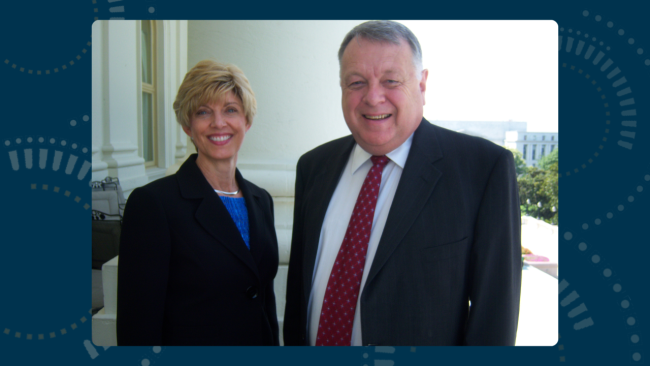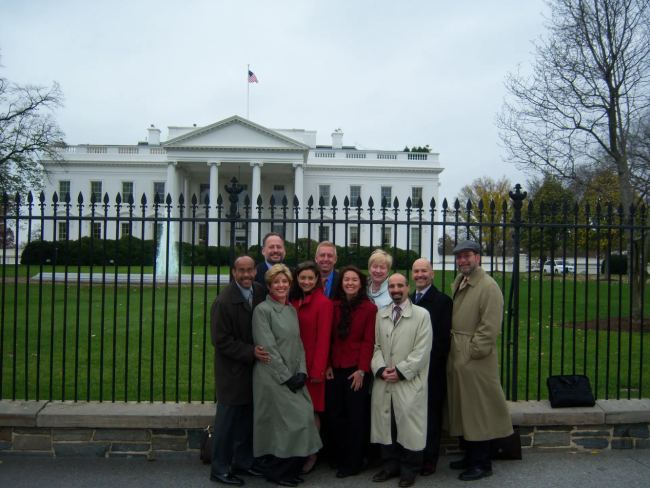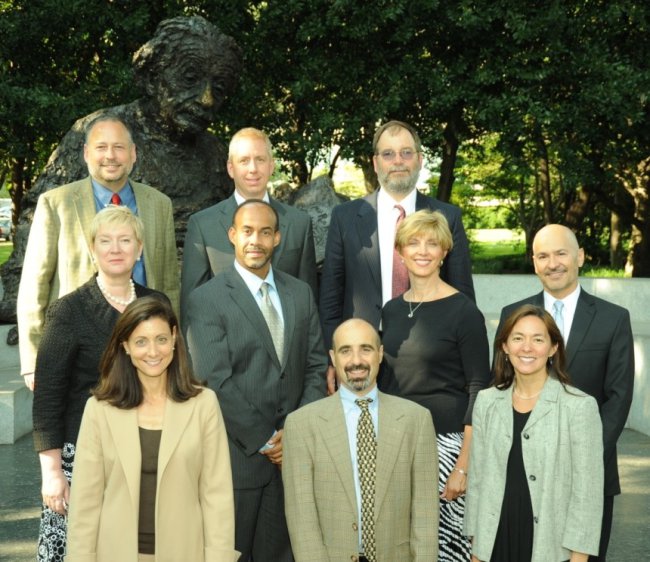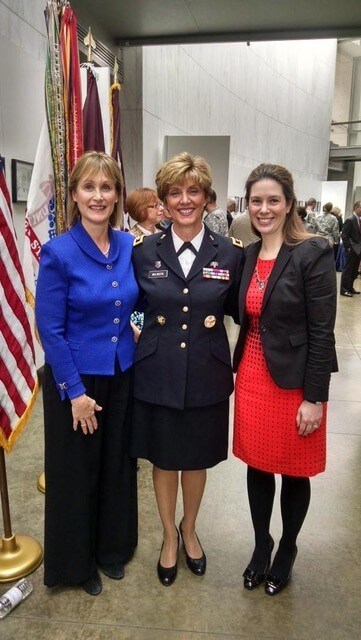October 19, 2023
Thinking Outside the Box: How the RWJF Fellowship Helped Army Reserve General and Health Policy Professor Dr. Peggy Wilmoth Transform Her Career

For nearly 50 years, the Robert Wood Johnson Foundation (RWJF) Health Policy Fellows program has sought to build a strong, diverse network of leaders and maintain a workforce skilled in health policy. By connecting health professionals with the first-hand opportunity to participate in the federal policy process, this nonpartisan program aims to improve health equity, care, and policy. To learn more about the fellowship experience, we hear from Dr. Peggy Wilmoth, a fellow from the class of 2009–2010. In the interview below, Wilmoth, professor at the University of North Carolina at Chapel Hill School of Nursing, discusses the immersive experience of the fellowship, being in the same room as President Obama, and the way the fellowship inspired her to significantly shift her career.
Before joining the program, Wilmoth navigated dual careers as a professor and a Brigadier General in the Army Reserve. She also wanted hands-on experience in the policy world that would be helpful in both careers. This led her to apply for the RWJF Health Policy Fellows Program, where she landed a placement in the office of the Speaker of the U.S. House of Representatives, Nancy Pelosi, during the time when the Affordable Care Act was passed. Read on to find out about Wilmoth’s takeaways from the program and why she calls the fellowship “a privilege” and “transformational.”
What did your life look like when you applied for the fellowship and what motivated you to apply?
I had two careers at the same time: I was teaching health policy at the University of North Carolina at Charlotte as a tenured full professor. I was also a one-star General in the Army Reserve commanding 6,000 soldiers over eight states and Puerto Rico who were deploying to go to war.
Although I was teaching health policy, I felt I was teaching it from a theoretical book perspective, with no great depth of personal expertise in health policy writ large. I got a fellowship flyer in the mail in my office, and it sat on my desk and spoke to me saying that this is something you need to apply for.
How did the trajectory of your life and work change after the fellowship?
I knew after I completed the fellowship that I did not want to go back to the same role I had been working in before. I’d come to the point where I needed to shake things up and take a risk. I took six months after the fellowship to figure out what was next, then accepted a dean position at Georgia State University.
It also changed my research trajectory. Pre-fellowship, I had been focused on quality of life/ psychosocial oncology. After the fellowship, I shifted my work to military-relevant policy, including military family and military child needs. I led a team that examined psychiatric evacuation out of theater, psychometric examination of deployment health assessments, and other topics focused on military mental health.
What was it like to participate in the orientation for the fellowship?
The orientation was from September to the middle of December and very fast paced. Since each one of us ends up in a different office, the orientation isn’t for the specific office to which you are assigned. It’s an orientation to the world of policy in Washington, DC. It introduces you to all the different components of executive agencies, policy making agencies, think tanks, the Congressional Budget Office, the Congressional Research Service, etc., to understand how they are all involved in this world.

What placement did you end up in?
During orientation, you go to different members’ offices and meet with their health policy people. I met with the staff from the Senate Committee on Veterans’ Affairs and also with the Speaker’s Office. After meeting with the Speaker’s Office, I interviewed a second time with Dr. Wendell Primus, Nancy Pelosi’s senior policy advisor, and was offered the opportunity to work there. He’s a legend in Washington. It was truly an honor to work in the Speaker’s Office, but to work with Dr. Primus was just incredible.
“There are two words I would use about the fellowship program: transformational and a true privilege.”
What was the focus of your work there?
It was all health policy. From January to March, the focus was on how to pass the Affordable Care Act (ACA) and then the focus after that was how to put the ACA into regulatory language.
I wrote portions of speeches based on policy that the Speaker’s writers would incorporate into her speeches. I met with all the different health-related groups that came in to talk about what they would like to see in the next appropriations bill. I also learned most policy essentially is written in committees but that the Speaker’s Office can be quite influential. Health policies, for example, are written in either the Energy and Commerce or Ways and Means Committee on the House side, not written per se in the Speaker’s Office, but I still had a ‘front row seat’ to observing how ‘the sausage’ is made.
In the 2010 election, the Democrats lost the House, so the last phase in the office was helping them move out, pack up boxes, and then move to the basement—watching how a peaceful transfer of power happens in the House.
Did the immersive and onsite nature of the fellowship impact your career path afterward?
Oh, without a doubt! Being there in the room, being in staff meetings with the Speaker, and watching her as a phenomenal female leader was so instructive.
I also got to witness President Obama at the State of the Union. I was also in the room when he was speaking to the House and the Senate Democratic sides on a Saturday before the ACA was passed. To be in the room with the President talking to them was such a privilege. There are two words I would use about the fellowship program: transformational and a true privilege.

What was your fellowship cohort like?
We had ten people in our cohort: nurses, dentists, internal medicine folks, pediatricians, a paramedic—Gregg Margolis, who is now the director of the fellowship program—and other health professionals. I made lifelong friends from this fellowship. We were each very, very different and came from various walks of life, but we blended well and I’m still very close with several of those from the fellowship.
What are you most proud of doing regarding policy since the fellowship?
One of my military assignments was in the Office of the Assistant Secretary of Defense for Health Affairs. While there I pulled together a team of researchers and we examined data around mental health in the military, how we assessed military mental health, and some of the issues that stemmed from time in the military after the surge in Iraq in 2007–2009. This was when an awful lot of psychiatric and mental health issues began to occur and we were able to get deployment policy change into U.S. Central Command because of the research my team and I had done.

What initially led you to your interest in joining the military?
I grew up in the 1960s when women were often limited to being secretaries, teachers, or nurses, so I chose the nurse box. My favorite aunt was a nurse and the woman across the street had been a WWII Army nurse. I watched Combat and all those war shows and would play war in the backyard with my brother. I wanted to be a Soldier, but at the time, women were locked out of the combat arms, however we could be in the health professions. So, I chose nursing and have never regretted that decision. I’m very privileged in that I was able to live my childhood dream of being in the Army and being a nurse.
“I can’t imagine my life without having done the policy fellowship. I can’t imagine where I would have been in my career had I not risked it and applied.”
What are you working on now?
I’m at the University of North Carolina at Chapel Hill, I teach and supervise graduate and doctoral students. I’m involved in policy in my volunteer work through the Reserve Organization of America, examining military family policy and health policy to advocate for those who serve in one of the Reserve Components of our Armed Forces, and through the North Carolina Nurses Association and the American Academy of Nursing.
Are there any books you’d recommend for those interested in doing similar work?
I recommend General Martin Dempsey’s book with Ori Brafman called Radical Inclusion about how to bring more perspectives to get to a better place in your decision making and your policymaking.
Also, Gloria Feldt’s excellent book, Intentioning: Sex, Power, Pandemics, and How Women Will Take the Lead for (Everyone’s) Good. Having ambition is great, but you have to put it into action. So, her book is about intention. I like reading about women who have stepped out and have gotten out of the box others try to put them in. I find that inspiring.
Is there anything else that potential fellowship applicants should know?
I can’t imagine my life without having done the policy fellowship. I can’t imagine where I would have been in my career had I not risked it and applied. I think I would have been in a box still. I know the policy fellowship pushed me out of my comfort zone and forced me to think bigger and differently.
Apply for the 2024–2025 fellowship class through November 1, 2023, at 11:59 pm EST. Mid-career applicants in health professionals, behavioral/social sciences, or with an interest in health and health policy are encouraged to complete the application to earn a prestigious place in the policymaking process. Apply now.
Learn more about RWJF Health Policy Fellows by following us on LinkedIn! For more information about applying to the program, visit our website. We appreciate your support in building a strong and diverse network leaders and maintaining a workforce skilled in health policy. Email info@healthpolicyfellows.local for questions about program opportunities.